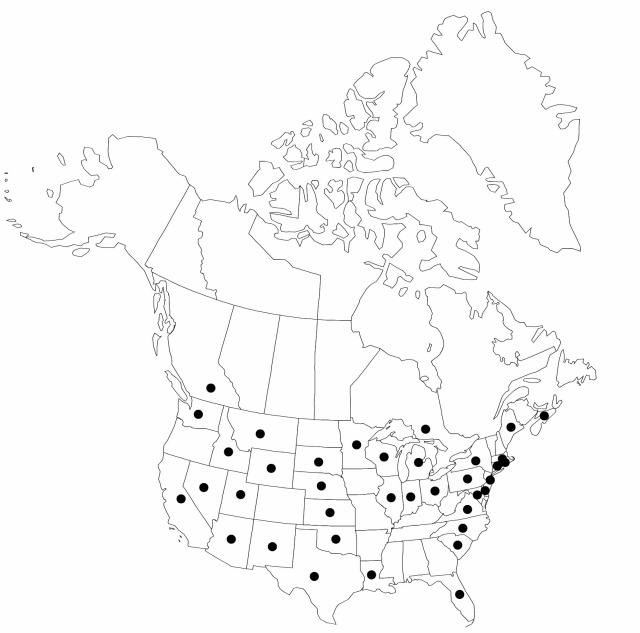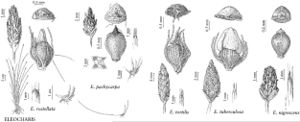Eleocharis rostellata
Fl. New York 2: 347. 1843.
Plants densely tufted, mat-forming by means of rooting culm tips. Culms 1.5–3 times as wide as thick, 20–100 cm × 0.35–2 mm, firm to hard, wiry, with to 8 subacute ribs, rarely nearly smooth; some culms arching or decumbent and rooting at tips. Leaves: distal leaf sheaths not splitting abaxially, proximally dark red to brown, apex usually reddish. Spikelets ovoid, 5–17 × 2.5–5 mm, apex acute; spikelets on stolons rudimentary, non-flowering, proliferous when rooting; proximal scale empty, amplexicaulous, ovate, 2–4 mm; subproximal scale with flower; floral scales 20–40, 2–3 per mm of rachilla, stramineous to medium brown, midrib region paler, ovate, 3.5–6 × 2–3 mm, membranous to cartilaginous, apex entire, rounded to subacute. Flowers: perianth bristles brown, equaling achene or tubercle, densely spinulose; anthers brown, 2–2.4 mm. Achenes often very variable within one plant, ovoid to obovoid or obpyriform, 1.5–2.5 × 1–1.2 mm, beak to 1 × 0.6 mm. Tubercles when present pale to dark brown, pyramidal, to 0.5 × 0.3 mm.
Phenology: Fruiting late spring in south, summer–fall in north.
Habitat: Very wet calcareous or brackish fens, springs, shores
Elevation: 50–2400 m
Distribution

B.C., N.S., Ont., Ariz., Calif., Conn., Del., Fla., Idaho, Ill., Ind., Kans., La., Maine, Md., Mass., Mich., Minn., Mont., Nebr., Nev., N.J., N.Mex., N.Y., N.C., Ohio, Okla., Pa., R.I., S.C., S.Dak., Tex., Utah, Va., Wash., Wis., Wyo., Mexico, West Indies (Cuba, Haiti, Puerto Rico).
Discussion
Eleocharis rostellata is highly competitive, often forming large monospecific colonies. The South American E. platypus C. B. Clarke is often treated as a synonym of E. rostellata. Eleocharis rostellata superfically closely resembles E. suksdorfiana in its culms, spikelets, and achenes, but differs in the absence of creeping rhizomes, presence of stoloniferous culms, absence of a flower in the proximal scale, and achene surface details. The collection of E. rostellata I have seen from Miami-Dade County, Florida, is from 1877. I have not seen vouchers for Archuleta County, Colorado, by H. D. Harrington (1954), or for the localities in Montana and South Carolina, which are based on the map in H. K. Svenson (1934).
